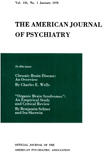EVALUATION OF CARBON DIOXIDE INHALATION THERAPY
Abstract
CO2 inhalation therapy produces favorable effects in a variety of neuroses and psychosomatic conditions, especially in anxiety states, phobic reactions, certain ill defined tension states, and conditions like spastic colitis and migraine headaches. It cuts across diagnostic boundaries, but is of little value in psychoses and firmly established obsessive- compulsive states. CO2 therapy lends itself peculiarly well to correlation with and facilitation of psychotherapy of the modified analytic type.
Healing mechanisms are not too clearly understood, but a breaking up of pathologic reverberating circuits in the nervous system seems to be an important action of CO2. Perhaps equally important is the abreaction of repressed emotional "material" that tends to be released by the inhibition of the higher cortical centers during the inhalations. The suggestive effects of CO2 are minimal and transient and play little part in the healing process.
As a rule it is desirable for the therapist himself to undergo at least a brief series of CO2 inhalation treatments. The subjective experiences so produced sharpen his awareness of the preverbal feelings that are often released by the action of the gas and greatly enhance his capacity to aid the patient in coming to grips with unconscious feelings brought close to the surface toward the end of the treatment.
Over a 4-year period a total of about 7,500 CO2 treatments have been administered by the author to a series of 290 patients. Evaluation of the clinical results of the first 100 patients, who seem representative of the total group, reveals that 42% may be classified as "Much Improved," 39% as "Improved," and 19% as "Unimproved."
CO2 narcosis therapy may thus be considered an important method of treatment for various types of neuroses and psychosomatic conditions. In many cases it is of therapeutic benefit by itself, but usually it is most effective when integrated with psychotherapy.
Access content
To read the fulltext, please use one of the options below to sign in or purchase access.- Personal login
- Institutional Login
- Sign in via OpenAthens
- Register for access
-
Please login/register if you wish to pair your device and check access availability.
Not a subscriber?
PsychiatryOnline subscription options offer access to the DSM-5 library, books, journals, CME, and patient resources. This all-in-one virtual library provides psychiatrists and mental health professionals with key resources for diagnosis, treatment, research, and professional development.
Need more help? PsychiatryOnline Customer Service may be reached by emailing [email protected] or by calling 800-368-5777 (in the U.S.) or 703-907-7322 (outside the U.S.).



